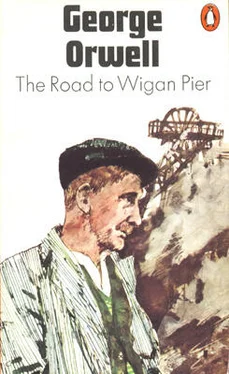Once again, here am I, with my middle-class origins and my income of about three pounds a week from all sources. For what I am worth it would be better to get me in on the Socialist side than to turn me into a Fascist. But if you are constantly bullying me about my ‘bourgeois ideology’, if you give me to understand that in some subtle way I am an inferior person because I have never worked with my hands, you will only succeed in antagonizing me. For you are telling me either that I am inherently useless or that I ought to alter myself in some way that is beyond my power. I cannot proletarianize my accent or certain of my tastes and beliefs, and I would not if I could. Why should I? I don't ask anybody else to speak my dialect; why should anybody else ask me to speak his? It would be far better to take those miserable class-stigmata for granted and emphasize them as little as possible. They are comparable to a race-difference, and experience shows that one can cooperate with foreigners, even with foreigners whom one dislikes, when it is really necessary. Economically, I am in the same boat with the miner, the navvy, and the farm-hand; remind me of that and I will fight at their side. But culturally I am different from the miner, the navvy, and the farm-hand: lay the emphasis on that and you may arm me against them. If I were a solitary anomaly I should not matter, but what is true of myself is true of countless others. Every bank clerk dreaming of the sack, every shop-keeper teetering on the brink of bankruptcy, is in essentially the same position. These are the sinking middle class, and most of them are clinging to their gentility under the impression that it keeps them afloat. It is not good policy to start by telling them to throw away the life-belt. There is a quite obvious danger that in the next few years large sections of the middle class will make a sudden and violent swing to the Right. In doing so they may become formidable. The weakness of the middle class hitherto has lain in the fact that they have never learned to combine; but if you frighten them into combining against you, you may find that you have raised up a devil. We had a brief glimpse of this possibility in the General Strike.
To sum up: There is no chance of righting the conditions I described in the earlier chapters of this book, or of saving England from Fascism, unless we can bring an effective Socialist party into existence. It will have to be a party with genuinely revolutionary intentions, and it will have to be numerically strong enough to act. We can only get it if we offer an objective which fairly ordinary people will recognize as desirable. Beyond all else, therefore, we need intelligent propaganda. Less about ‘class consciousness’, ‘expropriation of the expropriators’, ‘bourgeois ideology’, and ‘proletarian solidarity’, not to mention the sacred sisters, thesis, antithesis, and synthesis; and more about justice, liberty, and the plight of the unemployed. And less about mechanical progress, tractors, the Dnieper dam, and the latest salmon-canning factory in Moscow; that kind of thing is not an integral part of Socialist doctrine, and it drives away many people whom the Socialist cause needs, including most of those who can hold a pen. All that is needed is to hammer two facts home into the public consciousness. One, that the interests of all exploited people are the same; the other, that Socialism is compatible with common decency.
As for the terribly difficult issue of class-distinctions, the only possible policy for the moment is to go easy and not frighten more people than can be helped. And above all, no more of those muscular-curate efforts at class-breaking. If you belong to the bourgeoisie, don't be too eager to bound forward and embrace your proletarian brothers; they may not like it, and if they show that they don't like it you will probably find that your class-prejudices are not so dead as you imagined. And if you belong to the proletariat, by birth or in the sight of God, don't sneer too automatically at the Old School Tie; it covers loyalties which can be useful to you if you know how to handle them.
Yet I believe there is some hope that when Socialism is a living issue, a thing that large numbers of Englishmen genuinely care about, the class-difficulty may solve itself more rapidly than now seems thinkable. In the next few years we shall either get that effective Socialist party that we need, or we shall not get it. If we do not get it, then Fascism is coming; probably a slimy Anglicized form of Fascism, with cultured policemen instead of Nazi gorillas and the lion and the unicorn instead of the swastika. But if we do get it there will be a struggle, conceivably a physical one, for our plutocracy will not sit quiet under a genuinely revolutionary government. And when the widely separate classes who, necessarily, would form any real Socialist party have fought side by side, they may feel differently about one another. And then perhaps this misery of class-prejudice will fade away, and we of the sinking middle class — the private schoolmaster, the half-starved free-lance journalist, the colonel's spinster daughter with £75 a year, the jobless Cambridge graduate, the ship's officer without a ship, the clerks, the civil servants, the commercial travellers, and the thrice-bankrupt drapers in the country towns — may sink without further struggles into the working class where we belong, and probably when we get there it will not be so dreadful as we feared, for, after all, we have nothing to lose but our aitches.
1937
THE END
From the Colliery Tear Book and Coal Trades Directory for 1935.
In Orwell time one pound (£) was equal to 20 shillings (s.) and one shilling was equal to 12 pence (d.). England converted their currency system to decimal one (1 pound = 100 pence) between July 1967 and January 1971 (in several stages). — Comment by Dag.
The Coal Scuttle. The Colliery Yew Book end Coal Trades Directory gives a slightly higher figure.
The number of Corporation houses in process of construction in Sheffield at the beginning of 1936 was 1398. To replace the slum areas entirely Sheffield is said to need 100,000 houses.
For instance, a recent census of the Lancashire cotton mills revealed the fact that over 40,000 full-time employees receive less than thirty shillings a week each. In Preston, to take only one town, the number receiving over thirty shillings a week was 640 and the number receiving wider thirty shillings was 3113.
According to Chesterton, dirtiness is merely a kind of ‘discomfort’ and therefore ranks as self-mortification. Unfortunately, the discomfort of dirtiness is chiefly suffered by other people. It is not really very uncomfortable to be dirty — not nearly so uncomfortable as having a cold bath on a winter morning.
Orwell somewhat retracted this remark later. See ‘Inside the Whale’, England Your England , P. 120 (Seeker & Warburg Collected Edition).
For example: Some years ago someone invented a gramophone needle that would last for decades. One of the big gramophone companies bought up the patent rights, and that was the last that was ever beard of it.












